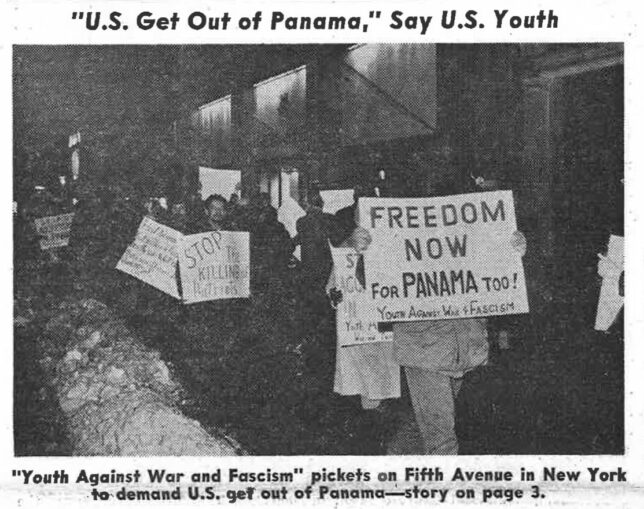Panamá 60 years after January 9, 1964
Beluche is a sociologist and anti-imperialist organizer in Panamá. Translation: John Catalinotto.
January 9, 1964, was Panamá’s true independence day. On that day, a group of high school students led the Panamánian people in a historic gesture marked by a simple but meaningful act: planting and raising a national flag on the territory of what was the Canal Zone, a U.S. colonial enclave built in the heart of the Isthmus, next to the canal.

On Jan. 14, 1964, Workers World Party’s youth organization, Youth Against War & Fascism, held a demonstration during an icy snowstorm on Fifth Avenue and 53rd Street, near a U.S. military information office, in solidarity with the heroic Panamanian youth who were challenging U.S. imperialism.
In spite of the outrage produced by the U.S. police and soldiers towards the students and their flag, in spite of the rain of bullets, the people responded en masse to the students’ call to jump over our “Berlin Wall,” the cyclone fence that separated Panamá City from the Canal Zone, to plant the tricolor Panamánian flag in that territory. More than 500 wounded and 21 dead did not stop the popular revolution that broke out on the night of Jan. 9.
For three days the people remained in the streets, surrounding the fence, lying on the ground to dodge the bullets, destroying every vestige of U.S. property in the cities of Panamá and Colón. A mass of between 10,000 and 20,000 people surrounded the President of the Republic’s residence demanding arms to defend the nation from U.S. aggression.
The oligarchic president, traditionally a puppet of the U.S. government, fearful of what could happen, refused to hand over the weapons and kept the Panamánian police at the barracks, but did something unusual: he broke diplomatic relations with the United States.
Jan. 9, 1964, changed the history of Panamá. It broke the colonialist status imposed by U.S. imperialism in 1903, when the U.S. separated Panamá from Colombia to impose the Hay-Bunau Varilla Treaty, which created the Canal Zone controlled by the U.S. as if the U.S. were sovereign. Jan. 9 was the act that proclaimed our independence and forced the empire to negotiate a new treaty that put an end to the “zone,” closed the military bases and allowed the transfer of the administration of the canal to Panamánian sovereignty.
Sixty years after that deed, the popular memory of Jan. 9 keeps the struggle against any form of colonialism alive and the Panamánian people have demonstrated it in the streets by massively mobilizing, between October and November 2023, against the attempt to maintain Cobre Panamá, a “mining enclave,” by Canadian company First Quantum Minerals Ltd.
A good part of the tens of thousands of people who mobilized against the mining contract did so because they preserve in their political consciousness the importance of defending national sovereignty from the voracity of imperialist interests. That is why, when it was made public that the contract gave the Canadians absolute control over the territory and mine airspace, many took to the streets in protest.
But this 60th anniversary of the Heroic Deed of Jan. 9, 1964, also requires considering that, between that date and the current one, there is an event with negative consequences for Panamánian history: the invasion of Dec. 20, 1989.
Jan. 9 was a victorious popular revolution (although it took a long time to materialize) that left us with the decolonization of the Canal Zone, the disappearance of the military bases and the transfer of the administration of the canal to Panamá. Its effects still reach us today, as the economic bonanza that we are experiencing has its main foundation in the reversion of the canal and the increase of its contributions to the national economy, even though the criteria being used to distribute its benefits are questionable.
On the other hand, on Dec. 20, 1989, Yankee imperialism was able to impose on us the neoliberal economic regime that had failed under [former President Ardito] Barletta, disguising it as “democratic.” The invasion allowed U.S. imperialism to reimpose the controlled and oligarchic regime of pre-1968; they even managed the possibility of the permanence of military bases disguised as a fight against drugs [Multilateral Anti-drugs Center or CMA of former President Ernesto] Perez Balladares, but they failed in the face of popular mobilization. Although, later, they imposed more subtle security agreements.
The invasion also made it possible to partly reverse the triumph of Jan. 9, 1964, with a Constitutional Title and an Organic Law that turned the Panamá Canal Authority (ACP) into an entity controlled by the oligarchy that did not fight for sovereignty (the new Zonians [U.S. citizens residing in the Canal Zone]) and from which the people remained excluded, until now.
Overcoming the negative effects of the invasion so that the Panamanian people can receive a greater share of the benefits generated by the canal will require the structuring of a great anti-imperialist, anti-neoliberal, democratic and popular movement that will assume political power to remove the sell out oligarchy from power.

